- Home
- A. J. Hartley
Will Power Page 3
Will Power Read online
Page 3
I stabbed at him, extending my left leg, keeping my right planted and then, as he parried and cut, pulled back to my original position. Textbook. He grinned. I lunged short and, as I recovered, set my body weight squarely over my front foot, throwing my balance off in ways I could only hold for a couple of seconds. He had parried my attack easily and was looking smug, overconfident. I sprang forward, landing on my right foot and lunging as far as I could reach.
The speed and aggression of the flèche attack caught him off guard, and by the time he saw it, it was too late. The spear tip punched through the starched white linen of his cuirass just below the shoulder and a spot of crimson blossomed and spread. His eyes rolled back and he sank to the cobbled road, holding his wound.
“Will!” called Mithos, from the saddle. I turned and found the others were almost upon us. Though Mithos had dealt one of the original troopers a cut across the shoulder blade, which had been enough to take him out of the struggle, the other was now trading blows with him, clearly reluctant to get too close till his fellows from the other end of the street were on hand. This was our chance.
Once again, I took Mithos’s powerful hand and was hoisted into the saddle. As I warded off the remaining soldier with the spear, our steed shuddered into motion. Behind us, the remaining soldiers, realizing they could not hope to catch us on foot, threw their spears in an erratic volley. One whistled over my head and clattered on the road ahead, another sparked against the stone wall to my right and fell to earth.
Three more turns, seven or eight blocks traveled, and no sign of the enemy. Our mount, however, was struggling. One of the flung spears had caught her hindquarters and the weapon’s point had torn a hole in the tissue of one thigh. It was a minor wound, but it was bleeding heavily and giving the animal a lot of pain. She wouldn’t run much further. Two more blocks and her canter became erratic as she tried to favor her other legs. Then, even this became too much for her and she stuttered to a halt.
Mithos glanced at the wound, slid to his feet without a word, and began to run. I followed, amazed we’d held off death this long, but still fully expecting to begin our Kingdom of the Damned tour within the next ten minutes or so. Unless they caught us and took us back for Lengthy Torture and Languid Execution, in which case the tour might start later.
What we saw on rounding the next corner suggested that ten minutes had been optimistic. This road marked the northernmost reaches of the city and, while the town lacked the fortifications of Cresdon or Ironwall, there were sentries at every exit. Stavis, you’ll recall, is an isolated bit of Empire territory connected to its lands in the West by little more than a road across the Hrof wastes. But except for that ribbon of paving across the desert, everything around the city was neutral territory. What that all added up to was that we were about twenty yards from never seeing another Empire soldier again, but from what I could see it may as well have been fifty miles.
There were soldiers everywhere. Lisha and the others may have been long gone, but we had lost several minutes in our earlier wanderings and news of the events at the Waterman had reached the city guards. A great throng of people had spilled out of the adjoining houses and inns to watch the inevitable capture of the notorious rebels as they attempted to leave. If this wasn’t bad enough, the remainder of the guards who had pursued us would be here in moments, complete with even fuller descriptions of the escapees, their probable locations, and some colorful suggestions for what to do with them. Down the street was a stone tower, four stories high and topped with a white flag with a diamond motif: inside it would be soldiers. For once, Mithos’s instinct matched my own. He found the first open tavern door—an inn called the Fisherman’s Arms—and made for the bar.
The place was buzzing with anticipation and, since everyone was clustering around the door and windows, we had no trouble getting served.
“Two pints of bitter, please, mate,” I said to a barman as he looked over my shoulder to see what was going on outside. “And close the door, will ya? It’s spoiling the fire.”
“What the hell are you doing?” Mithos growled with a disbelieving stare.
“I’m ordering a couple of . . . you know. I thought you wanted . . .”
“We came in here to get out of the street and to think, that’s all.”
“Well, since I’ve ordered them, we’ll just drink up and be on our way, eh?” I ventured.
Mithos sighed and closed his eyes tightly, his brow creasing with intense concentration. I turned to see a face I recognized entering by the same door we had. He was a tall man in his late fifties, clad in a suit of black, his hair and beard an even silver, carefully trimmed. His eyes met mine blankly and he stepped on toward the bar.
“Mithos,” I whispered, turning away and utterly failing to look casual.
“Quiet, Will,” muttered Mithos, “I’m trying to think.”
“Yes,” I agreed hastily, “but a man has just come in who was in the Waterman.”
“What?”
“He was at the bar when we were eating. I think he has seen us.” I glanced around with a nonchalance I did not feel. “Yes. He’s coming over.”
And in seconds he was there, standing beside us and politely asking the barman for a drop of claret. Then, as the barman walked away, he spoke without turning to face us. His voice was smooth, refined even, and was touched with a smile I did not like. It spoke of dry, distanced amusement. Cold.
“Well, gentlemen,” he said, “you’ve had quite an evening.”
“I’m sorry?” said Mithos.
“No need to disguise it,” he replied, “and certainly no point. You have led Lightfoot and his men in quite a merry dance, though it seems you are, shall I say, tiring.”
That last word was spoken with an ominous emphasis that had floated behind the slightly amused tone of his other words.
“Who the hell are you?” I muttered, turning on him and caring nothing for Mithos’s irritated sigh. He knew who we were well enough, so why pretend?
“My name is Dantir, rebel hero,” he said, turning to face me. Then a joyless smile cracked his face and he added: “Just joking. Sorry. I am Linassi of . . .”
“Why the hell would I care . . .” I began, rankled by his composure and confidence.
“Excuse me,” he replied with a calming gesture. “Perhaps I should have made myself clearer. I am Ambassador Linassi and I have a coach outside.”
This was clearly supposed to mean something to me. It didn’t, but that was a feeling I was used to. Mithos looked up and met Linassi’s eyes for the first time. Apparently, something was going on here that I knew nothing about.
“And you have? . . .” began Mithos.
“Full diplomatic immunity, yes,” answered the stranger, gazing emptily across the bar. “My driver is waiting in the yard. I suggest we move quickly.”
“What?” I asked, looking from one to the other. “What’s going on?”
“Don’t be obtuse, Will,” said Mithos, taking a hurried swill of beer and getting to his feet. “Just follow the ambassador.”
“He could be anyone,” I spluttered, ignoring the fact that the man was standing beside me.
“My papers,” he said, plucking a wad of parchment from inside his jacket. “You can examine them as we go.”
Out in the street, the sounds of the curious crowds dwindled significantly. A glance toward the open door told me why. The unit from the Waterman had regrouped and were mingling with the sentries.
“It looks like the decision has been made for you,” said the ambassador, if that was what he was.
Mithos nodded solemnly, returned his papers, and indicated that he should lead the way. The older man inclined his head gravely and, without another word, led us in a series of long strides across the room.
I say “us,” but, for most of those strides it would be truer to say “Mithos,” because I stayed where I was, considering the odds of just losing myself in the crowds and finding a way out when things had died down. Th
en the crowd at the door parted and I caught a glimpse of white and silver. I didn’t know if the guards were coming to search the place, or if they were just looking for refreshment, but I couldn’t wait around to find out. So with eyes down and one hand rubbing my face in as obfuscating a manner as I could manage short of putting a bag on my head, I half-ran in pursuit of Mithos.
A door by the hearth gave way to a narrow passage smelling of damp and animals and leading to the stableyard, where, beside a wagon piled high with crates, sat a single coach. It was black as pitch, painted over with a highly polished lacquer, and trimmed with delicate ropes of gold. A crest hung on the side doors, featuring a dragon and a lamb on an azure shield.
“Pretty flash,” I muttered to no one in particular, which was just as well since it was universally ignored.
A man in a dark and heavy overcoat who had been standing close to the coach knocked his pipe out against the wall and climbed up the stoop. Picking up his lash, he began cautiously walking the horses, all white geldings, until the coach was in the middle of the yard and ready to go. He leaned over the side and flipped a latch deftly with the butt of his whip. The carriage door swung open and Ambassador Linassi, with a small and wordless gesture, indicated that we should get aboard.
I glanced uneasily at Mithos, far from comfortable at the prospect of taking a spin in this glorified hearse with its questionable ambassador and his taciturn driver. Mithos’s eyes said nothing and he climbed in, sitting himself comfortably on the red velvet seats inside. I followed, gingerly, and perched on the opposite seat, facing him and looking for assurance. The ambassador sat beside him, and his sharp, blue eyes met mine for a brief, blank instant, before he pulled the door shut behind him and rapped on the roof. As soon as we began to roll off, he stretched across toward me. I, with a start of panic, recoiled.
“Relax, Mr. Hawthorne,” he said, his voice as smooth as before but touched with that same gentle amusement, “you are quite safe in here. For now.”
Then he continued to lean across and, with a sudden tug on a cord, pulled down the window shade. He did the same on the other side and we were plunged into absolute darkness. Only several minutes later did my eyes seem to adjust, and even then I could make out little beyond shadows.
The coach rattled out of the inn yard and onto the road.
“She gives a very smooth ride, does she not?” said the ambassador suddenly, his voice unwinding in the darkness like an unseen cobra.
“Very good,” I stammered, rather louder than I had intended, and was struck by the curious sense that I was alone in there, that I was talking to myself. Many moments passed before the ambassador added, “Steel sprung suspension. Nothing finer.”
I felt obliged to say something but could not think of the words. I found myself nodding agreement to the darkness and then, as the silence extended itself, I abandoned speech altogether, focusing instead on my own anxieties, all of which seemed to be amplified by being in this curtained box, this cave, this pit of darkness on wheels. Still, it was likely to be a short journey, even if it was into the arms of the Empire’s leading torturer. How bad could things get?
“Papers,” said an imperious voice outside, perhaps only a foot and a half from my head. With sudden insight I realized that things could get pretty bad.
Something touched my knee and I jumped, striking my head on the roof. Then it came again, more insistent this time. Putting out my hand, I found myself holding the ambassador’s documents. Barely daring to breathe, I pushed them through the crack in the window blind, leaning back in my seat to avoid being seen. As I did so, I caught a glimpse of steel helms plumed with white. Then the papers were snatched from my grasp by the invisible sentry and I flinched again.
“You have got to be joking,” growled the unseen soldier, inches from my right ear. I sat very still, muscles tight and bowels clenched.
There was one of those half-decade pauses that actually lasts about three seconds. Then we heard the sibilant hiss of exasperation that can only come from an Empire sentry foiled by red tape. The papers were stuffed back through the window in a fist that didn’t care if it caught one of the passengers on the jaw. Then it was gone, and a voice commanded the driver to “Move on” in a tone that left us in no doubt as to what the speaker thought about diplomatic immunity.
In a spasm of relieved joy I contemplated leaning out of the window and shouting something witty as the carriage rolled off. Something told me, however, that the one thing the guards would thank me for now would be the word or gesture that would lead to one of those unfortunate incidents which leaves huddles of troops standing over civilian corpses and muttering to their knowing superiors about how one of them had seemed to be brandishing some lethal, garrison-leveling weapon that had turned out to be a salt shaker. . . .
I considered Mithos, who was sitting silent as the grave in the darkness opposite me, and wondered if the guards would have had the chance to finish me off. He probably had his sword point poised for a discreet lunge at my liver in case of precisely such an eventuality. I figured I’d stay where I was and keep my mouth shut for once. We rolled off, smooth as ever, and I swallowed hard. Behind us the voices faded and we headed north.
“There now,” said the ambassador, as if he did this every weekend, “that wasn’t so bad, was it?”
If it was a real question, no one treated it as such. There was another long silence and then the ambassador added, in the absent tone of one remarking on the chance of rain, “You gentlemen seem to find danger wherever you turn.”
“Thus far our luck seems to have held out,” said Mithos. It was one of his usual faintly grim but otherwise toneless remarks, but the impenetrable darkness of the carriage lent it a certain low hostility.
“Indeed,” replied the elderly man, and his voice matched the other in its steely but otherwise unreadable quality. “Thus far.”
It could have been just the oppressive and disorientating blackness of the carriage, but, for whatever reason, I realized that my body had not relaxed one iota since we left the Empire guards and territories behind us.
SCENE III
The Only Way to Travel
We sat like that, silent and edgy, for about two miles. The darkness in the carriage was thick and liquid, giving the slightest rustle of clothing or creak of its steel spring suspension an immediate and unnerving resonance. I almost leaped out of my seat several times at the sound of someone shifting fractionally in theirs. Eventually, I mustered the courage to squint through the window blind, only to find that the land beyond it was almost as dark as the inside of the coffin on wheels we were riding in.
I could just make out a line of tall and narrow trees running alongside the road and pointing up into the heavens like spear tips. Cedars, perhaps. A quarter moon had just begun to rise, casting no useful light, so even the trees had a slightly sinister aspect that made absolutely no sense whatsoever. I noticed—from outside myself, as it were—that I was clinging to the edge of my seat with one claw of a right hand while the fingers of my left drummed silently, obsessively, on the seat cloth.
Mithos, his sheer grimness rivaled for once by Ambassador Death’s, reached across to hold the shade open. What little light there was fell on his dour features as he gazed out into the passing trees. “This is the Vetch road?” he said.
“Yes,” said the ambassador. “There is an inn where we can rest before we reach the village.”
“The Black Horse?” Mithos asked, turning from the window. “Good. We have companions to meet there.”
“That is most convenient,” said the ambassador. “Our roads lie together.”
Convenient indeed, I thought to myself uncomfortably. Everything about this little jaunt was extremely convenient, as if it had been arranged weeks ago. The idea that it was all coincidence seemed no more plausible to me than the tale of Dantir, renowned rebel-drunk and gypsy wanderer. I was wary of getting caught out twice.
“Perhaps your friends can join me on my road north
,” ventured the ambassador.
Perhaps not. The sooner I got out of this mobile graveyard, the better.
“What is your destination?” asked Mithos, casually enough, though I guessed he was probing.
“North,” he said simply.
“Specific!” I muttered, my discomfort switching suddenly into irritation.
“No,” agreed the voice of the ambassador, calm and unoffended. “But accurate.”
“Just not very helpful,” I persisted.
“The ambassador has a right to keep his own business to himself,” Mithos remarked coolly.
“I can’t say it fills me with confidence, that’s all,” I said sulkily into the blackness. The hint of skeptical hostility this remark contained had not really been intended, but I was wound as tight as a Dranetian merchant’s purse and in such situations tended to be the tool of my words, rather than the other way round.
The ambassador chuckled invisibly, a rich and throaty gurgle of a laugh that raised the hair on the back of my neck.
“Ever the realist, eh, Mr. Hawthorne?” he said when his amusement had passed. “Will Hawthorne the pragmatist. William the cynic, Bill the perceptive. A man who knows the world and sees through its various shell games as if they’re made of glass. A man too shrewd for principles, too practical to be distracted from the truth. . . .”
This was an alarming speech, particularly for someone who had never set eyes on me before. He had pigeonholed me a little too accurately. It was like he had somehow seen into the way my head worked and seen the way I—in my less humble and bewildered moments—tended to see myself. I shifted in my seat.
Suddenly there was a flash of light and the inside of the carriage flickered into the shifting radiance of a greenish flame. It sprouted and guttered from the tip of the ambassador’s right forefinger. As my jaw fell open, he spoke again, looking me squarely in the face with an odd smile. “But what is real, Mr. Hawthorne? What is true?”

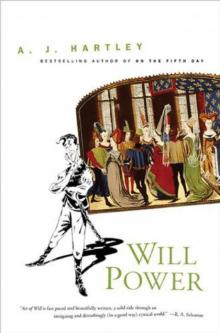 Will Power wh-2
Will Power wh-2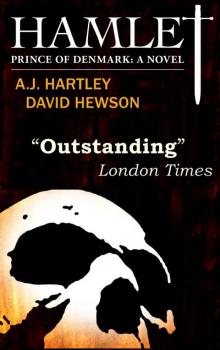 Hamlet, Prince of Denmark
Hamlet, Prince of Denmark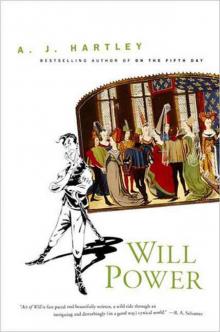 Will Power
Will Power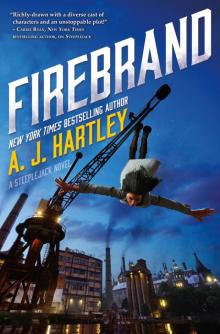 Firebrand
Firebrand A Novel
A Novel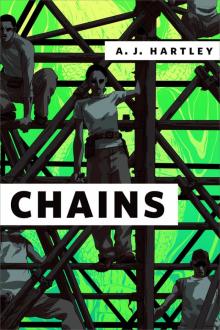 Chains
Chains Guardian
Guardian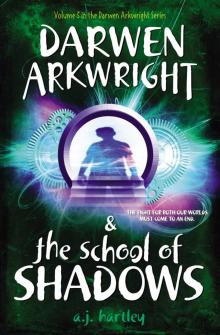 Darwen Arkwright and the School of Shadows
Darwen Arkwright and the School of Shadows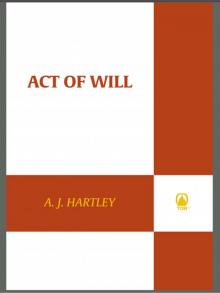 Act of Will
Act of Will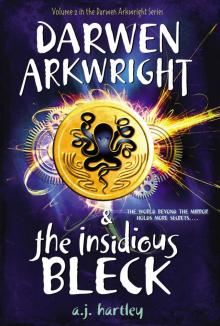 Darwen Arkwright and the Insidious Bleck
Darwen Arkwright and the Insidious Bleck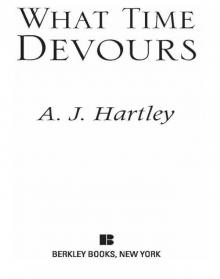 What Time Devours
What Time Devours